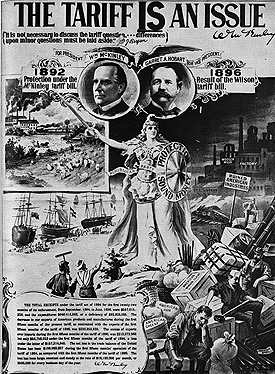28 June, L.A. Times
25 July, Harper's Weekly
14 September, Rocky Mountain News
16 October, Boston Globe

Homepage
© 2000, Rebecca Edwards, Vassar College


Tariffs had been a key political issue throughout the nineteenth century, with industrial and Northeastern interests generally in favor, farmers usually opposed. The principles involved had been established by Alexander Hamilton, the nation's first Secretary of the Treasury. High import tariffs, paid by overseas manufacturers who wanted access to U.S. markets for such products as textiles, tin plate, china, and sugar, gave an advantage to U.S. manufacturers and provided revenue for the federal Treasury. Critics argued that American consumers paid higher prices for the necessities of life, because tariffs established a high "floor" price and enhanced industrialists' profit, rather than helping workers.
After the South's secession at the start of the Civil War, Republicans raised tariffs sharply. Through a host of revisions they remained high until Woodrow Wilson's administration in the 1910s. In 1896, the name of Republican candidate William McKinley was widely associated with the "McKinley Tariff" of 1890, which he had shepherded through Congress as an Ohio Representative. That tariff proved unpopular--but the depression of 1893, which began under a Democratic administration, refocused criticism on the Democrats.
McKinley and other Republicans hoped to make the tariff a major issue in 1896. They argued that Democratic "free trade" (lower tariffs under Cleveland) had helped cause the depression and unemployment. William Jennings Bryan, however, seized the initiative and fought the campaign on the silver question, dismissing the tariff as an "irrelevant" issue. Despite McKinley's efforts, tariff "protection" became a secondary issue, though still important to many Republicans, who argued that tariffs enabled American men to earn a family wage and "protect" their families. The tariff thus formed a key part of Republicans' appeal to laboring men.
With McKinley's victory and Republican control of Congress, protective tariffs remained high after 1896. In the wake of depression, however, even many die-hard tariff advocates conceded that tariffs were not a total answer to unemployment and low wages. After 1900, many former Republicans joined Democrats and Socialists in seeking new remedies for the problems of industrial labor.

Homepage
© 2000, Rebecca Edwards, Vassar College